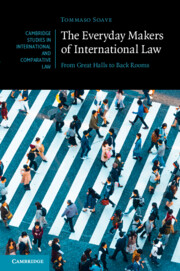Book contents
- The Everyday Makers of International Law
- Cambridge Studies in International and Comparative Law: 170
- The Everyday Makers of International Law
- Copyright page
- Dedication
- Epigraph
- Contents
- Preface
- Abbreviations
- 1 Carnegieplein 2, 10:00 am
- 2 Coffee, Cigarettes, and International Judicial Practices
- 3 A New Generation of Litigators
- 4 Telling a Story
- 5 The Invisible Army
- 6 The Three Wise Monkeys
- 7 The Lyophilization of Life
- 8 The Memo
- 9 To Capture the World
- 10 Bricolage
- 11 The Explorer
- 12 A Four-Letter Word
- 13 What Does It Mean…
- 14 The Stage
- 15 The Moment of (Constructed) Truth
- 16 Truth Woven Together
- 17 Spijkermakersstraat 9, 8:00 pm
- Index
- Cambridge Studies in International and Comparative Law
9 - To Capture the World
Published online by Cambridge University Press: 03 November 2022
- The Everyday Makers of International Law
- Cambridge Studies in International and Comparative Law: 170
- The Everyday Makers of International Law
- Copyright page
- Dedication
- Epigraph
- Contents
- Preface
- Abbreviations
- 1 Carnegieplein 2, 10:00 am
- 2 Coffee, Cigarettes, and International Judicial Practices
- 3 A New Generation of Litigators
- 4 Telling a Story
- 5 The Invisible Army
- 6 The Three Wise Monkeys
- 7 The Lyophilization of Life
- 8 The Memo
- 9 To Capture the World
- 10 Bricolage
- 11 The Explorer
- 12 A Four-Letter Word
- 13 What Does It Mean…
- 14 The Stage
- 15 The Moment of (Constructed) Truth
- 16 Truth Woven Together
- 17 Spijkermakersstraat 9, 8:00 pm
- Index
- Cambridge Studies in International and Comparative Law
Summary
This chapter describes how judicial bureaucrats characterize the state conduct or measure that gave rise to the proceedings. That characterization is a value-laden exercise whereby discrete aspects of reality are captured into the gravitational fields of the various courts and tribunals. In its normal course, state action is irreducibly pluralistic and does not lend itself to univocal labels: no domestic measure is ever only about ‘borders’, ‘investment’, or ‘human rights’. Yet, labels are necessary to attract the measure to the jurisdiction of this or that institution. The choice of the terms by which one describes state conduct determines the normative prism through which one looks at it, and reflects a struggle for appropriation among competing fora.
Keywords
- Type
- Chapter
- Information
- The Everyday Makers of International LawFrom Great Halls to Back Rooms, pp. 174 - 184Publisher: Cambridge University PressPrint publication year: 2022

